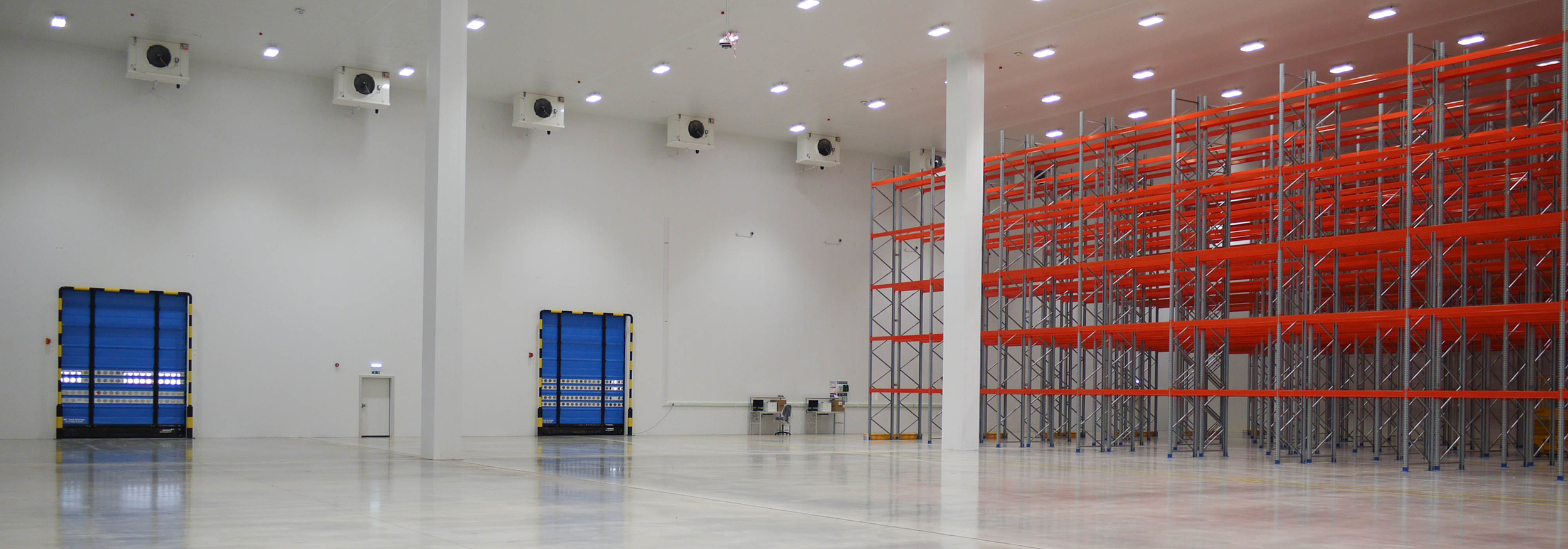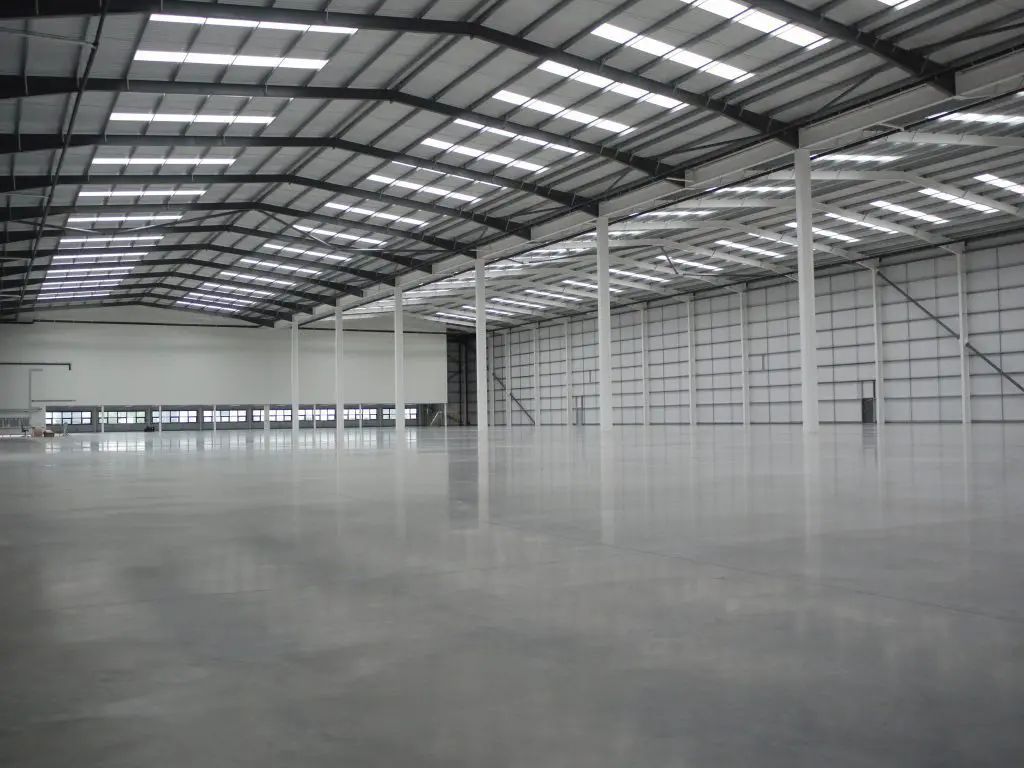Cold Rooms & Temperature-Controlled Rooms
Cold Rooms for Bespoke Requirements
MTCSS is the expert when it comes to designing and building cold rooms and temperature-controlled envelopes. We work as main contractors on cold room construction, overseeing every aspect from design and installation to health and safety and waste management.
Turnkey cold storage projects span a wide range of industries, including:
- Food and drink retail and manufacturing
- Warehousing and distribution
- Pharmaceutical and medical
- Aeronautical and automotive
- Farming and agriculture.
We have worked with businesses across these industries and more, supplying and installing bespoke cold rooms, walk-in chillers and walk-in freezers to suit their applications.
So, whether you require a dual-compartment cold room to store meat products or you need a 100,000m³ warehouse transformed into smaller temperature-controlled rooms for pharmaceutical storage – MTCSS have the knowledge and expertise to work alongside you to design bespoke cold storage for your specifications.
What Is A Cold Room?
Cold rooms are temperature-controlled, built-in spaces designed to store a wide selection of goods. Their temperature-controlled envelope is made from insulated cold room panels and uses a refrigeration system to achieve a consistent temperature range.
This includes:
- Chiller cold rooms
- Freezer cold rooms
- Ambient areas
- Dual/multi-compartment rooms
They offer businesses bespoke rooms with cooled or frozen storage and improved energy efficiency – making them much more cost-effective and accessible than traditional fridges or freezers.
Thanks to the huge range of design options, industries and businesses also have increased control over what their goods or food storage looks like, so it can work best for their needs.
What Are The Benefits of Cold Rooms?
The benefits of a cold room will depend on the type you have, the industry you’re operating in, and the purpose it’s used for. However, the main benefits of chiller rooms include:
- Improved Quality and Longevity of Stock
With sufficient storage space and the correct temperature for your products, a commercial cold room can ensure your customers get the best-quality stock for as long as possible.
- Reduced Energy Consumption and Lower Energy Bills
Using multiple standalone fridges can increase costs and reduce energy efficiency, whereas a cold room is extremely efficient to run!
- Maximised Space and Storage
MTCSS can utilise the existing space you have and create bespoke chiller or freezer rooms to maximise your storage.
- Unmatched Versatility
Whether you work within the pharmaceutical industry, food and drink preparation in a commercial kitchen, or warehousing we can create a bespoke cold room specific to your needs.
- Bespoke Customisation
There are many customisable elements of your cold room from the door to the walls themselves. Contact the team today to discuss your requirements.
Learn more about the benefits of a cold room on our blog page here
Not Sure What Type of Cold Room You Need?
The MTCSS team will work with you to understand your business and its processes, so we can help design the perfect cold storage solution for you. We can do this via a telephone or video call or, if required, a site survey.
To find out more or to discuss your project, fill in the form on the right or request a quote. Alternatively, you can also call us on 01886 83381 or email us at sales@mtcss.co.uk and we’ll get back to you in 24 hours.
Make An Enquiry

What Does A Cold Room Include?
Every element of cold storage design depends on what type of temperature-controlled space you choose, from walk-in fridges to walk-in freezers and solutions for ambient areas.
However, most commercial cold or chiller rooms will include:
- Cold room wall panels
- Cold room doors – from hinged and sliding doors to high-speed doors
- Cold room flooring
- Refrigeration systems & temperature control – including cold room refrigeration, air conditioning, and cold room lighting
1. Cold Room Wall Panels
Depending on the products you would like to store and the temperatures needed, your cold room suppliers will install wall panels in a range of thicknesses. This allows for a range of temperature-controlled spaces, including:
• Chiller cold rooms (also known as walk-in fridges):offering +0 to +8 degrees
• Freezer cold rooms (also known as walk-in freezers): between -1 to -40 degrees
• Dual compartment cold rooms: one cold room split into two separate rooms, these can include 2 chillers, 2 freezers, or a chiller and a freezer. You can also have multi-compartment cold rooms!
• Ambient areas: maintaining temperatures of +10 to +30 degrees
Walk-in cold rooms, freezer cold rooms, and ambient temperature control rooms are built from food-safe insulated cold room panels.
2. Cold Room Doors
A chiller or freezer room will need an access point (or multiple), which is selected based on who and what needs to access the temperature-controlled rooms and the frequency of their use.
- Hinged cold room doors: ideal for pedestrian access, smaller-sized doors, and cold rooms that don’t have a high volume of traffic.
- Sliding doors: perfect for pallet access, larger-sized doors are easier to open than hinged doors!
Our cold room door range includes doors suitable for varying temperature ranges and we also have insulated doors suitable for automation.
3. Flooring for Cold Rooms
Specific cold room flooring is only specifically needed within a walk-in freezer but can utilised by a walk-in fridge or ambient room if requested.
Within a freezer cold room, it is beneficial to have specific flooring to not only maintain the internal temperature but also to stop damage from what will be accessing and moving around the room.
For example, if you only have pedestrian foot traffic coming in and out of your cold room, you won’t need a heavy-duty floor in comparison to a room that has pallet trucks or vehicles coming in and out.
4. Cold Room Refrigeration Systems and Temperature Control
Temperature control is key to your cold room or ambient room running efficiently and effectively. With various refrigeration and temperature control options available, cold-room suppliers MTCSS take away any confusion by working with you to understand which system will benefit your storage solution the most:
- Monoblock refrigeration system: a ‘plug and play’ integral refrigeration system that is installed through the cold room wall and ideal for small capacity chiller and freezer cold rooms
- Split refrigeration systems: ideal for small to large-capacity walk-in cold rooms and include an evaporator and condensing unit
- 100% backup refrigeration: in the event of power or refrigeration failure, a backup system will kick in to ensure your products are continuously protected in the event of an emergency and maintain the internal temperatures of your cold room.
- Ambient temperature control: for rooms that require specific temperatures above +10 degrees, we can provide an ambient temperature-controlled solution
- Air conditioning: for areas that require air conditioning, such as offices and kitchens
MTCSS also supplies and installs chiller/freezer cold room and ambient room lighting solutions. We work with innovative suppliers and LED lighting manufacturers to provide the highest-quality lighting solutions for your temperature-controlled rooms.
Interested In a Cold Room For Your Business?
Whether you know exactly what you’re looking for when it comes to a cold room or ambient solution, with drawings and specifications to hand, or are unsure about what you want or need, the MTCSS team can help.
We’ll work with you to talk through your ideas and business processes and design walk-in fridges, freezer cold rooms, ambient areas, and any other cold storage that meets your exact requirements and budget.
As the main contractors on your project, we’ll handle everything from supply and installation to health and safety and waste management.
To get started, get in touch with a member of our team today – you can fill in an enquiry form here, call us on 01886 833381, or email us at sales@mtcss.co.uk and we’ll get back to you as soon as we can!
Frequently Asked Questions
Rather than being stuck with under-counter freezers, a modular cold room can offer businesses of all sizes a commercial cold space that is built outside the walls of the building.
This means that you can have the industrial or commercial refrigeration or freezing solution you need, no matter the size or shape of your current premises.
As long as you own or have permission to use some kind of nearby land, the team at MTCSS can help!
Give us a call on 01886 833381 to discuss your needs.
The benefits of a cold room will depend on the type of cold room that you have, the industry you’re in and the purpose it’s used for. The main benefits that cold rooms can provide are:
Improve the quality and longevity of your products – With sufficient storage space and the correct temperature for your products, a cold room can help to improve your product quality for your customers
Reduce energy consumption – Using multiple standalone fridges can be less cost and energy efficient, whereas a cold room is extremely efficient to run!
Maximise your space and storage – MTCSS can utilise the existing space you have and create a bespoke cold room to maximise it
Versatile – Whether you work within the pharmaceutical industry, food & drink preparation or warehousing, we can create a bespoke cold room specific for you.
Customisable – there are many customisable elements of your cold room, from your cold room door to your cold room walls. Contact the team today to discuss your requirements.
Learn more about the benefits of a cold room on our blog page here
The components you’ll need in your cold room will depend on the type of cold room you require.
In general, the main cold room components you will need are: cold room panels to form for the walls and ceilings a cold room door for access, refrigeration systems to maintain internal temperatures (if temperature-controlled) and cold room lighting.
If you’re looking for walk-in freezer then you will also need a cold room floor and heater system (due to the negative temperatures they maintain, this helps to prevent frost heave).
It’s worth noting that you would require slightly different components if your cold room was external. Get in contact with our team to discuss your requirements further.
The temperature range required in your cold room will reflect the products you’re wanting to store, but as a standard the temperatures our cold rooms can maintain are:
Chiller Cold Rooms – Suitable for maintaining a temperature range of +0 to +8°C and are more efficient than using multiple standalone fridges
Freezer Cold Rooms – Ideal for temperatures ranging from -40 to +0°C, making it the perfect cold room solution to preserve and protect your products for longer
Dual Compartment Cold Rooms – These can be a combination of multiple temperature ranges depending on your requirements (EG; one freezer cold room and one chiller cold room compartment).
Ambient Areas – Beneficial for temperatures ranging between +10 and +30°c and are beneficial for keeping both your products sustained and your employees happy (due to their versatility)
Cold room maintenance isn’t essential, but it’s highly recommended. Having an inefficient chiller or freezer cold room could have negative impacts upon your products (depending on the issue) if left alone and could potentially ruin your stock!
As well as having negative impacts on your products, it also can pose severe health and safety risks for your employees such as getting stuck in your freezer cold room.
Cold room maintenance can help to prevent any disasters in your cold rooms, improve the longevity, help you save energy (and as a result, save you money in the long run because it can improve your cold rooms lifespan, meaning there are fewer maintenance costs as often)
Learn more about cold room maintenance here
Most industries and businesses can benefit from a cold room: if you use upright fridges and freezers, or require temperature-controlled storage, then the chances of you benefitting from a cold room are high.
There are an array of purposes for cold rooms, meaning there is greater flexibility for a bespoke cold room that benefits your business and exact requirements. If you’d like to understand how a cold room could benefit you, get in touch with the MTCSS team today!
So whether you work within the food & drink retail industry, as a farmer/horticulturalist or in a hotel restaurant, MTCSS have a cold room solution that’s perfect for you.
MTCSS offer a range of different cold rooms that can be designed bespoke to your requirements. Below are the different types of cold room that MTCSS can accommodate for:
Chiller cold rooms – Ideal for restaurants, farm shops, mortuaries and an array of industries that rely on a chilled temperature for their business
Freezer cold rooms – Ideal for restaurants, butchers, food & drink processing and retail due to the negative temperatures it maintains. We can also adhere to any blast freezer or pull-down freezer requirements that you may have (Enquire with our team for more information!)
Dual and multi-compartment cold rooms – Ideal for when you need to achieve two, or more, differing temperatures for your products and business processes.
Modular cold rooms – Ideal for most industries that require any type of small to medium capacity cold storage, as modular cold rooms can be installed to achieve temperatures between –20 and +10°C
We can also provide bespoke cold rooms that are designed to adhere to your specific requirements and specifications, as well as ambient areas (with or without temperature control) which are ideal for food industries where positive temperature control is imperative
Get in contact with the MTCSS team today, or find out more about the different types of cold rooms by reading here
You might be thinking about the correct cold room application for your business and have no idea where to start. The MTCSS team can help.
If you’re looking to store produce and prepare products, at a positive temperature, then a chiller cold room is most likely the ideal cold room for you. Whereas if your products need to be preserved at a negative temperature, then a freezer cold room will likely benefit you best.
For more information on the best cold room for your business and requirements, get in contact with the MTCSS team today!

Bert De Mooij, Bespoke Chiller Cold Room for Q Flowers Ltd 2021
From coming into contact with MTCSS to the finished product, has been a great and easy process.
The members of the team listened to our wishes and offered us exactly what we needed. From picking the type of cooler machines, the doors, the lights - everything was exactly adjusted to our wishes.
Even though through the COVID period where availability of materials were challenging, the cold room was finished on the date as was planned when signing for the order.
Very professional company from start to finish.

Catherine Hester Fenwick, Ambient storage at Brabourne Wines 2021
‘Brabourne Wine is a small, family run vineyard in Kent. In an Area of Outstanding Natural Beauty, a Conservation Area and with listed buildings, we needed to find a solution to store our wine without building afresh or making any material differences to the current buildings. MTCSS were amazingly flexible. They worked with us to develop a solution that fitted inside one of our outbuildings. Given the limitations on space and the requirement to have racking suitable for pallets, virtually everything about the project had to be bespoke but Darren never lost patience with the endless queries in the planning phase. Once on site, the team was professional, friendly, flexible and quick. They have delivered a solution which is perfect for our needs and exceeds our expectations. We are at the smaller end of their usual customer base, but we were never made to feel as though we were any less important than a major supermarket chain. We would certainly recommend them to anybody needing a controlled climate for storage (or any other reason)’

Chris Rudd, Frank Rudd & Sons
" From the initial enquiry to project completion, the team at MTCSS were both prompt and professional - delivering exactly to our requirements. " Chris Rudd, Frank Rudd & Sons Office Installation

Cold Room Refurbishment at Steve’s Family Butchers
Steves Family Butchers now has a fantastic refurbished cold room, which actually looks like a whole new cold room thanks to MTcss cold storage solutions. We found they responded in a very quick and helpful manner which meant that they communicated well with us and kept us informed well. The refurbishment was completed to a very high standard in a professional manner. We are exceptionally pleased with the service that we received.

Dual Compartment Cold Room Installation, London
From the beginning I found Gem’s customer service fantastic, out of all of the companies we spoke to for quotes she was the most responsive and attentive. Even when we were still finalising and it wasn’t confirmed if we were proceeding with MTCSS yet, she was always great with keeping in contact to see if we needed anything, and very responsive with emails, and also phone calls.
Andy and Nathan, have been great throughout the entire process. Both have been on hand for any queries we have had and very responsive again to all forms of communication. Everything has been handled promptly and efficiently both before, during and after the build. Any questions we have had they have always gotten back to us with an answer very quickly.
The gentlemen who completed the install here on site, where very friendly and mindful of business operations while completing work. Each day they would check in with who was here in the morning to explain what they would be doing, what access they required, and asked if and how this might affect our operations or customers. Again, they were very clear and open with communication and was happy to help find solutions when we had issues with the shelving.
Overall our experience with you has been very good and we have been left a happy customer. I would also just like to say a thank you to yourself Gem, Nathan and Andy as you have all been very great throughout our customer journey!


